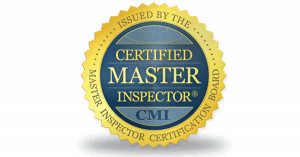Inspecting Your Roof – Prevent Water Damage
The typically price for a mid-sized bungalow to be re-shingled is approximately $8,000 dollars. You can get a cheaper price but you will not get the same protection. As I inspect roofs I am always amazed that the shingles on a roof can be brand new, but all the flashings, vents and chimneys are old, rusted with nail holes, dented and sometimes not properly sealed. The roof may look good from a distance but you typically only get what you pay for. Reading over the details of your roofing contract will identify if you are getting new flashings etc.
A home inspector is not required to get up on the roof but he should at least get to the edge of the roof to make his observations. From the edge of the roof you can take pictures of the different planes of the roof. Are all the surfaces in good condition? When there is no major cracking or curling of shingles the roof covering is considered in good shape. Some of the more common roof deficiencies are:
- Hail damage to the roof coverings ( picture to right shows missing shingle tab)

- Exposed nail heads on ridge shingles, venting, and roof penetrations
- Deteriorated plumbing vent boots
- Soft roof decking
- Loose flashing
We don’t identify the roof system just the roof covering because a roof system combines multiple components into that system. The home inspector will inspect all vents and stacks for proper flashings and seals.
Masonry Chimney Inspection
Masonry chimney’s are a common roof feature and have to be closely inspected to identify defects. The crown, or mortar cap, of most older chimney’s is typically always found to be in poor condition. The masonry crown is typically cracked. All newer chimneys are required to have a one piece concrete cap or have a poured in place cap installed. This is to prevent the entry of water. The chimney cap is not visible from the ground so is rarely inspected, which can allow water penetration to go un-noticed until the brick below become damaged.
The counter flashing on the chimney should be installed in a groove cut into the masonry a minimum of a 1/4 inch. Step flashings should not be exposed, as rain can penetrate and reach the roof sheathing. Any water penetrating your chimney will usually cause damage to your chimney flue and exterior masonry joints. During the winter the continual freezing and thawing cycle will wreak havoc on your chimney if not properly installed and protected. Many roofers will just reseal chimney flashing with tar or caulking instead of taking the time to re-install the proper flashing.
Most homeowners are unable to climb their roofs and not familiar with the requirements for sealing and patching masonry. Any missing mortar and cracks should be filled with patching mortar or having bricks re-pointed. If you use silicone caulking on a chimney ensure it is fire-rated. Caulking is only a temporary fix that will typically only last about 6 months and you will still require a professional to repair cracks and mortar.
use silicone caulking on a chimney ensure it is fire-rated. Caulking is only a temporary fix that will typically only last about 6 months and you will still require a professional to repair cracks and mortar.
While inspecting your roof, a home inspector is not required to remove flue cap covers etc but you can usually see the top 6 feet of flue with the aid of flashlight. Any cracks in flue or missing mortar would be considered a major problem and typically the home owner will be notified to hire a professional to make a complete inspection of chimney and make any required repairs. Two professional opinions should be obtained by the homeowner, we recommend that professional who’s making any repairs to inspect the property, further in order to discover repair related problems that weren’t identified from the top of the flu.
Many builders do not install edge flashing ( drip edge ) on the roof. The edge flashing prevents the water from running back under shingles causing water damage to sheathing. This can cause plywood to de-laminate and start to rot. The end result is the eventual replacement of your sheathing along the eave of your roof. The Ontario Building Code does not specifically identify the requirement for a starter strip, so unless you ask your roofer to include it, you probably won’t get one installed.
Looking for a Home Inspection is Wasaga Beach? Call Roger Frost the Wasaga Beach Home Inspector.
Cell -705-795-8255
Toll Free – 888-818-8608
Email [email protected]
Always remember ! An educated consumer is a smart consumer.
